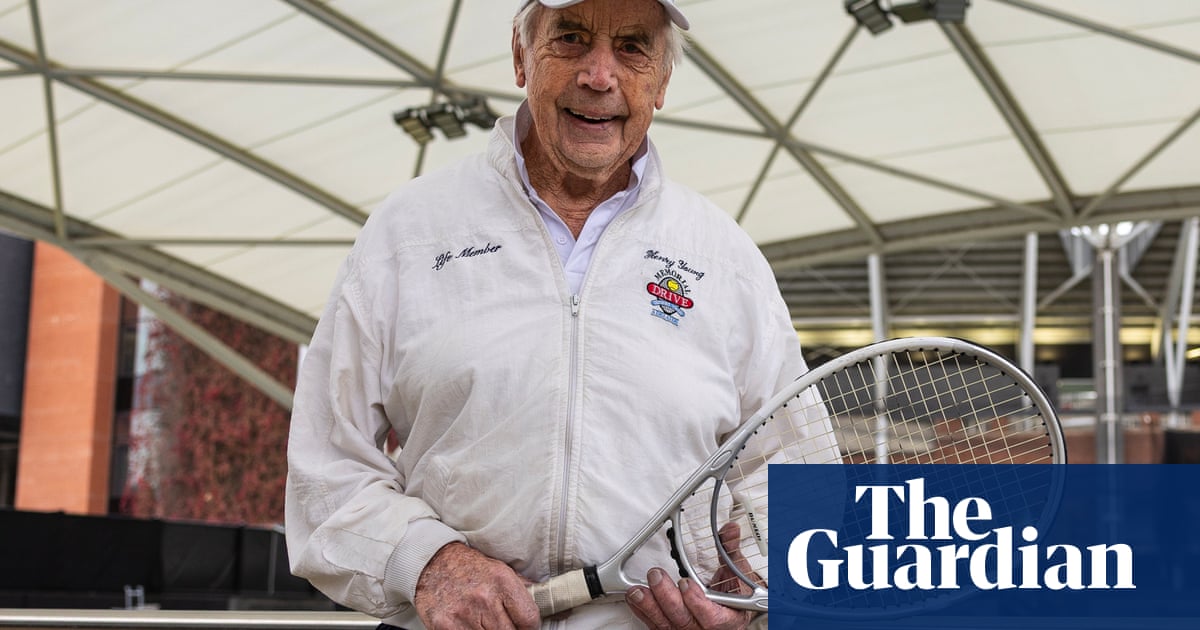Henry Young doesn’t mind being asked about his secret to a long, active life – it comes with the territory when you’re a 101-year-old competitive tennis player. It has its perks, like getting to play on centre court during the Australian Open, but what he does mind is that it’s consideredsoremarkable that he is playing at all. That he is seen as extraordinary and there must be some magic trick that keeps him going.
“What bugs me is that people give up their tennis when they have some kind of injury,” Young says. “I’m a monument to the medical profession because I’ve had so many injuries and I just persevere, and then tennis repairs you.”
Just as a sore calf doesn’t have to mean the end of the road for a runner, or a pulled hamstring signal the end of a football career, Young wishes the prospect of injury didn’t deter older people from playing sport. But staring down the barrel of a long rehabilitation process can be daunting, and returning to sport and exercise after injury undeniably gets harder as you age, so an ever-increasing amount of determination is required each time. This is not something Young is lacking.
“Two new knees, a new hip, pacemaker for my heart, hearing aids in one ear and a cochlear implant in the other and two broken noses,” he says. “You just can’t keep a good man down.” Young’s doggedness is key to playing for so long – he just can’t stop, it’s not in his nature.
Tennis has featured in Young’s life since school, along with rugby and then squash during his time as a fighter pilot in the New Zealand navy. But when he returned to work on the land in South Australia after the second world war, he could only pick up a racket a few times a year. It wasn’t until Young was 70 and retired that tennis became such a big part of his life. Winding around War Memorial Drive in Adelaide 30 years ago, he passed the tennis club with a billboard out front saying “good tennis players wanted” and thought he’d have a crack.
“They said, ‘you have to get tennis lessons unless you belong to a tennis club,’ and I didn’t want to take lessons,” Young says. So he made up a club. “I said that I belonged to the Inglewood Tennis Club. [Inglewood] was the name of a neighbouring property where we used to play tennis. And they took it.” As Young had suspected, he played well enough to satisfy the recruiters at Memorial Drive so no lessons were required. “That’s when it started,” he says. “And I’m competitive so I started really playing, and making it my sport, which it still is.”
Now a centenarian with three decades of competitive tennis under his belt, Young is preparing for the ITF Masters Championships in Croatia in October. He plays three to four times a week, often with his friend and sometimes doubles partner Gerry Prideaux, and spends a little time in the gym at his retirement complex. That training regime is about to diversify further. “I’ve bought myself a rowing machine,” Young says. “I’ve set it up next to the window … so every morning I’m going to do 20 minutes rowing in the Adelaide hills.”
Young made history in 2023 as the first 100-year-old to play in the World Masters Individual Championships. “It’s only recently that they’ve started to make it a bit easier for me,” he says. “I used to have to play down in the 80-year-olds [age category]. But then they made it 85, now they’ve got the 90s, and some of the countries are even going to 95.” He’s sure it won’t be long before there are enough players over 100 to have their own age group too. “I’m doing my little bit to persuade people to keep on trying, because we’re all living longer these days.”
Sign up toAustralia Sport
Get a daily roundup of the latest sports news, features and comment from our Australian sports desk
after newsletter promotion
Young is happy to share his advice for staying healthy as you age and swears by “wholesome thoughts” and a balanced diet with a twist. “I watch my diet, and part of my diet is that I drink three two-litre [cartons] of Farmers Union iced coffee every week,” he says. His attachment to iced coffee is so strong that he’s always itching to get back home to it when he travels interstate. The coffee is the outlier in an otherwise fairly standard menu. “I like everything, I like my meat and my fish and vegetables … I make sure that I get that full variety,” he says. “I snack on nuts during the day and I’ve got my iced coffee, and that really keeps me fit.”
However, Young’s number one tip for people of any age is no secret at all. “I would encourage everybody to play tennis,” he says, claiming the medical profession supports his view that it’s the best ball sport for you. “In tennis, win or lose, you gain something. It’s very nice to be able to say to the man at the other end of the tennis court, ‘it was a good win, but you had to work for it,’ and you both laugh. They’re the ones that you remember, the games that you really had to fight for, and that’s competition … it’s good for you.”
